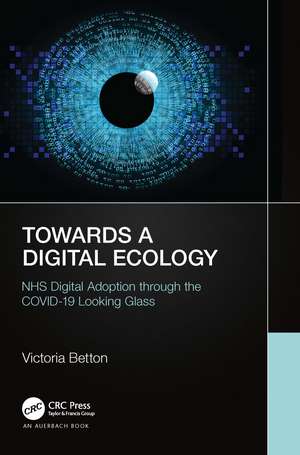Towards a Digital Health Ecology at the NHS
Autor Victoria Bettonen Limba Engleză Paperback – 28 feb 2022
This book documents use of technology in the NHS through the lens of the first pandemic shock. Our healthcare system, paid for by general taxation and free at the point of demand, was conceived and developed in a firmly analogue world. Created in 1948, the NHS predates the invention of the World Wide Web by some forty years. This is not a book simply about technology, it is a study of the painful process of reengineering a mammoth and byzantine system that was built for a different era.
The digital health sector is a microcosm of the wider healthcare system, through which grand themes of social inequality, public trust, private versus commercial interests, values and beliefs are played out. The sector is a clash of competing discourses: the civic and doing good for society; the market and wealth creation; the industrial creating more efficient and effective systems; the project expressed as innovation and experimentation; lastly the notion of vitality and leading a happier, healthy life. Each of these discourses exists in a state of flux and tension with the other. This book is offered as a critique of the role of digital technologies within healthcare. It is an examination of competing interests, approaches, and ideologies. It is a story of system complexity told through analysis and personal stories.
Preț: 345.63 lei
Preț vechi: 363.81 lei
-5% Nou
66.15€ • 68.53$ • 55.20£
Carte disponibilă
Livrare economică 28 februarie-14 martie
Livrare express 13-19 februarie pentru 30.33 lei
Specificații
ISBN-10: 1032109742
Pagini: 272
Dimensiuni: 156 x 234 x 21 mm
Greutate: 0.42 kg
Ediția:1
Editura: CRC Press
Colecția Auerbach Publications
Public țintă
Professional and Professional Practice & DevelopmentCuprins
Descriere
Towards a Digital Health Ecology : NHS Digital Adoption through the COVID-19 Looking Glass is about technology adoption in the UK's National Health Service (NHS) as told from the inflection point of a disaster. In 2020 the world lived through a disaster of epic proportions, devastating humanity around the globe. It took a microscopic virus to wreak havoc on our healthcare system and force the adoption of technology in a way that had never been seen before.
This book tells the story of digital technology take-up in the NHS through the lens of that disaster. This book documents use of technology in the NHS through the lens of the first pandemic shock. Our healthcare system, paid for by general taxation and free at the point of demand, was conceived and developed in a firmly analogue world.
Created in 1948, the NHS predates the invention of the World Wide Web by some forty years. This is not a book simply about technology, it is a study of the painful process of reengineering a mammoth and byzantine system that was built for a different era. The digital health sector is a microcosm of the wider healthcare system, through which grand themes of social inequality, public trust, private versus commercial interests, values and beliefs are played out.
The sector is a clash of competing discourses: the civic and doing good for society; the market and wealth creation; the industrial creating more efficient and effective systems; the project expressed as innovation and experimentation; lastly the notion of vitality and leading a happier, healthy life. Each of these discourses exists in a state of flux and tension with the other. This book is offered as a critique of the role of digital technologies within healthcare.
It is an examination of competing interests, approaches, and ideologies. It is a story of system complexity told through analysis and personal stories.
